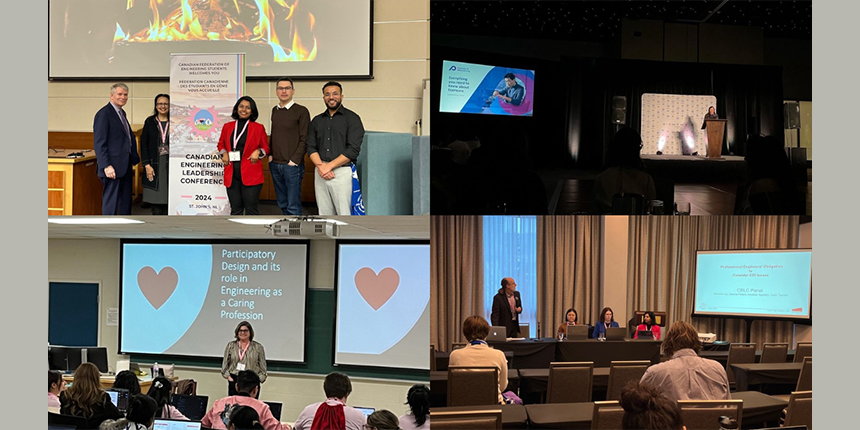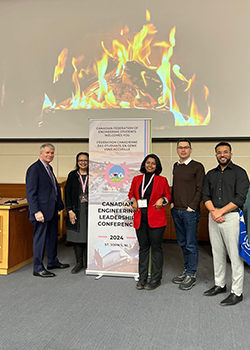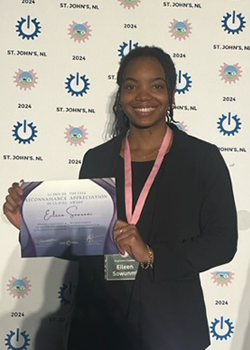

Engineers Canada welcomed the new year with their strategic partner, the Canadian Federation of Engineering Students (CFES), by participating in the national Canadian Engineering Leadership Conference (CELC), hosted this year by Memorial University of Newfoundland.
“Engineers Canada’s partnership with the CFES has spanned many years, reflected in our role as a participant in and Legacy Sponsor of CELC, as well as CFES conferences focused on sustainability in engineering and EDIA, and the Canadian Engineering Competition”, said Jeanette Southwood, Engineers Canada’s Vice President, Corporate Affairs and Strategic Partnerships.
This year's CELC theme was "Equitable Engineering: Building the Skills to Build a Better World". Southwood and Eileen Sowunmi, Associate, Outreach and Belonging, participated in the opening remarks in person, alongside video remarks from the President of Engineers Canada, Nancy Hill.
Later that afternoon, Southwood and Sowunmi led a workshop on Envisioning a Better Future that included the vision and purposes of Engineers Canada, discussion of the importance of EDI and Truth and Reconciliation in the engineering profession, and the concept of EDI as a technical skill; in addition, feedback was collected from the students to paint a picture of what a better future would look. Hill presented the keynote speech in person at the CELC closing banquet. Her speech touched on the evolution of equitable engineering, the current state of representation in engineering, and the role everyone can play in leading the engineering profession into a more equitable future.

Southwood was also a panellist at the fireside chat led by CFES’ Aayush Vij alongside Sheldon Baikie of Newfoundland Power (who is also the Chair of Engineers Canada’s Indigenous Advisory Committee) and John Gamble, President and CEO at the Association of Consulting Engineering Companies - Canada (ACEC-Canada). Key topics during the fireside chat included: What does "equitable engineering" mean and why is it important in today's world of technology and innovation?; What are examples of engineering initiatives that have successfully prioritized accessibility and inclusivity, and how do they build towards a better world?; and How can engineering professionals foster a culture of inclusivity within their teams and organizations to ensure diverse perspectives are considered in the design and development process?
This year’s sessions also consisted of a breadth of topics in relation to the theme of equitable engineering, from communication skills, navigating career paths, navigating post-secondary with a disability, building sustainable communities and networks, design and development, and more. The conference also consisted of a banquet, career fair, and networking session that gave sponsors and students an opportunity to interact.
Engineers Canada also sought feedback and collaboration on its Strategic Priority to accelerate 30 by 30 and two of its Core Purposes: Fostering recognition of the value of the profession and sparking an interest in the next generation of engineers and Promote diversity and inclusion in the profession that reflects Canadian society.
In addition, Engineers Canada Board member, Darlene Spracklin-Reid, led a session on participatory design and its role in engineering as a caring profession; former CEQB Chair Dennis Peters, PEGNL’s Director of Registration Heather Appleby, and PEO Councillor Michelle Liu along with CFES’ Zarin Tasnim presented on professional engineers' obligation to consider EDI issues and professional regulation and engineers’ statutory mandate to serve a diverse public; and CEAB member (who will be CEAB Vice Chair beginning July 1) Ray Gosine led a session as part of our work on Core purpose 1: Accreditation, hosted by CFES’ Paulina Alhassan.
Overall, Engineers Canada was pleased to speak and interact with the more than 200 engineering student leaders from across Canada who participated in CFES CELC.

One final surprise of the conference was to have Sowunmi awarded with the CFES Appreciation Award for significant contributions to the CFES by a non-student.
“I was very grateful to have been awarded by CELC this year,” Sowunmi said. “CELC truly demonstrates the passion and dedication of future engineers toward a better engineering profession, as it equips student leaders with knowledge and skills to foster a welcoming and progressive engineering profession. Engineers Canada looks forward to next year’s CELC.”


